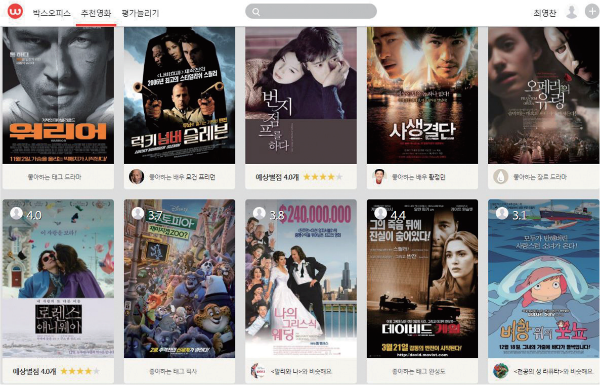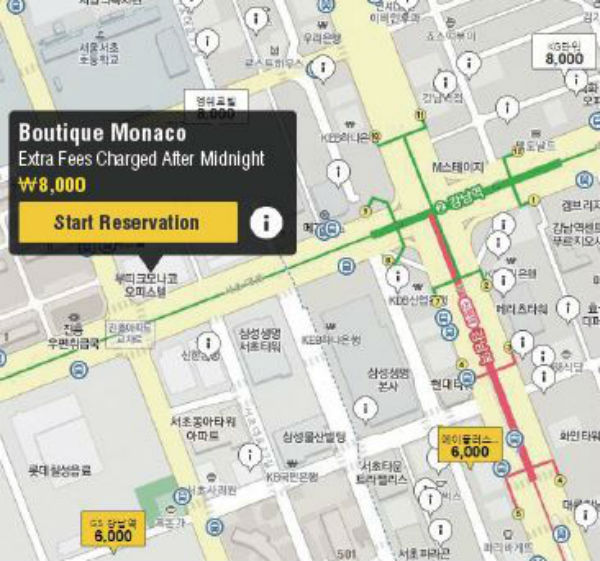The film Okja gathered much interest in Korea this summer due to its rather unusual platform of delivery in Korea, Netfilx. The possibility of enjoying a new movie release in the comfort of one’s home is appealing to many people. Numerous services similar to Netflix have appeared in recent years as well, such as Kakao Taxi, Yanolja, and Nation of Delivery. All of the mentioned services have a common property in the respect that they focus on connecting offline services through online platforms. These businesses are called O2O services because they connect online users to offline services. The Sungkyun Times (SKT) now covers how O2O services have started to spread throughout people’s daily lives, along with their benefits and weaknesses.
Advent of O2O Services
What are O2O services?
The term O2O was made to describe the business trend that seeks to link offline services to online consumers. For instance, calling a taxi in Korea was not possible before without the help of a large taxi enterprise, but it is easy nowadays through various online platforms such as Kakao Taxi or Uber. The growth of the mobile market was a key factor in the appearance of O2O because the consumers’ wish of receiving offline services through smartphones grew larger by the day. Based on a survey done on 61,238 people by the Korea Internet and Security Agency (KISA), 86% of all responders used their smartphones as a means of Internet access and 51% of online consumers did their shopping through smartphones. Although receiving products through the Internet was not something new, the idea of receiving offline services with a few clicks on the smartphone was. Online bridges now exist in many offline services including delivery, lodging, movies, and even marriage. The advent of O2O was natural since consumers were seeking for convenient online intermediaries slowly, but surely.
Sharing Economy Realized through O2O
The concept of a sharing economy is used to explain O2O in many cases since their essential features are mutual. After the major economic crisis in 2008, a distinguishing change in the pattern consumption appeared. People wanted to make efficient use of resources and merchandise that were manufactured but disregarded. A sharing economy describes this economic tendency of ‘sharing’ already-made products at rational prices by connecting willing salesmen with ready consumers. In this sharing process, an intermediary is deemed necessary in order to maximize the procedure’s efficiency. Under ideal circumstances, a sharing economy will bring a win-win situation to consumers, sellers, and intermediaries. The lack of credibility in intermediaries was an obstacle in the realization of a sharing economy, but a remarkable mediator, O2O, has emerged in recent years. Thanks to trustworthy O2O services that have come to be, the ideal situation of a sharing economy took a step closer to reality. Airbnb is a typical example of an O2O service intertwined with the objective of a sharing economy. Cheap lodging is provided by a house owner who wishes to loan it to travelers through the help of a negotiator. Every group of interest benefits with the simple addition of an honest intermediary.
O2O’s Exceptional Characteristics
Less Expense Spent on Dealings
Normally, a business not only has to produce goods or services, but also has to deliver them to the purchasing customer. In many cases, managing delivery lines will result in extra money spent since carriage vehicles and drivers need paying for. This delivery phase of transactions, however, can be handed over to an O2O service that specializes in it to lessen the expense. Less expense allows sellers to offer their services at lower prices and consumers will benefit from this reduction of cost. The delivery O2Os profit from commission and online advertisements during this process. Moreover, major O2Os are even known to discontinue commissions after sufficient growth as they can profit enough through advertisements alone.
Korea’s largest food delivery O2O, Nation of Delivery, announced that their sales have increased by 43%, monthly orders by 67%, and registered sellers by 38% during the first year since they discontinued commissions. Businessmen have reduced their prices even more since the O2O delivered free of charge, customers were able to purchase at even lower prices, and intermediaries were able to profit through the advertisements on their online platforms. The ideal win-win situation aimed at by the sharing economy mentioned before is becoming possible through the emergence of various other O2O services.
Less Time Searching for Services
Information Technologies (IT) these days focus on the relations between people and the Internet, Internet and objects, and people and objects. The key is to find the pattern of how people are consuming online resources and experimenting with possible applications on everyday objects. O2O services prospered through these new IT discoveries and lessened the consumers’ trouble of searching for services.

Netflix and Watcha Play are the world’s and Korea’s largest movie O2Os respectively. These platforms gained their popularity through several special features, and the auto-suggestion feature is one of their most outstanding characteristics. The database finds the user’s movie viewing patterns through the ratings that they left and compares the discovered pattern with users that seem similar in order to specify which movies to suggest. The time spent searching for which movie to watch and actually watching it can be reduced to a matter of minutes through O2Os.
Park Here is another well applied case of O2O technology. Park Here is an O2O that searches nearby parking lots through the location information of smartphones, shows how many parking spaces are available, reserves one, and provides mobile payment services. Time spent going from one parking lot to another can be reduced considerably through this simple O2O service. Comparing massive amounts of data to lessen time searching for a service and providing it right away is an important characteristic of O2Os.

Countless Number of Services Possible
The true potential of O2O services lies in its innumerable number of applications. In theory, every single offline service that exists today can be provided online at least in one way, if not in many more. Medical services, lawyer services, car washing and fueling services are already nothing out of the ordinary, and many unique O2O services are opening up as well. There is a casting O2O in Korea that provides actors’ profiles and videos for producers that might be interested and 14,000 actors have registered already. Since the idea of an O2O is to efficiently connect consumers with sellers, a manufacturing phase is not needed in starting a service, giving O2Os’ range of business a massive amount of potential.
Obstacles Hindering the Advancement of O2Os
Fatal Gap of Database Construction
Establishing an O2O service is not as easy as it seems, however, due to the gap in database construction. It is imperative for mobile services to secure enough data to actually start an O2O, but venture enterprises find this step very difficult. For example, when Google started its food delivery service, the databases of stores were constructed through algorithms on its Google Map database. On the other hand, venture entrepreneur Kim Bong-Jin, Chief Executive Officer of Nation of Delivery had it different. Kim mentioned many times in his interviews that finding enough data to start the business was extremely troublesome. He said digging through apartments’ trash cans for menus was on the everyday agenda when he first started his O2O.
Statistics also show that a venture enterprise has a low possibility of survival in the O2O market. According to the Korean Institute of Science and Technology Information, the O2O market itself has shown an annual increase of 42.2%, but the number of venture businesses has only increased at an annual rate of 3% during the last three years. Furthermore, the profit of venture businesses has dropped by 50% during the last five years. Major companies such as Kakao have no such problems as they have expanded to home cleaning, taxis, buses, hair shops and much more during the last couple of years, but it is hard for new companies to prosper.

Successful O2O venture companies are trying to solve this problem by contributing free education to O2O entrepreneurs. Nation of Delivery offers 120 hours of business education and chances of investment to participators. Nation of Delivery disclosed that the 1,500 business owners who participated in this education had their annual profit increased by 1.9~2.2 times compared to the year before. In order for O2O to actually expand to a countless number of services, the survival of various venture companies is mandatory, which means that overcoming this gap of databases is needed.
Unstable Boundary of Online and Offline Services
Due to the fact that O2Os do not actually produce any goods or services and only intermediate them, competition between companies are usually settled through relentless promotions. Coupang, Ticket Monster, and We make Price are Korea’s biggest social commerces, but they are in a very unstable position. In order to beat their competitors, they offer irrationally cheap prices resulting in tremendous amounts of losses every year. Although they are prolonging bankruptcy thanks to investors, they need to find a profit structure that does not rely on outside help.
Old regulations and laws are also obstacles to O2O services. Since O2Os are online services that intermediate offline services, many companies are having trouble with double regulations. Small business founders are irritated by the intrusion of O2Os and are demanding reinforcements of the Fair Trade Act. O2Os, on the other hand, had Electronic Commercial Laws and other online regulations to worry about in the first place. New regulations should be made to match the new services because this boundary position of online and offline is an unstable one as of today.
Unethical Users Diminishing O2O’s Credibility
Recent inhumane actions by some O2O users have started to harm the intermediates’ credibility. Last year, an Uber driver killed six people and seriously injured two others with a gun during business hours. The year before that, there was a sexual assault by an Uber driver as well. Many users spoke out in uneasiness that Uber should change its employment procedures and thoroughly check the drivers’ identifications, but their argument was declined. Uber replied that they do not want their drivers discriminated against by previous criminal records and that the recent crimes committed by the drivers could not have been predicted anyway.
There much corruption in real estate O2Os as well and users are frustrated by the many false entries that deceive them. Cheap properties to entice customers turn out to be fake ones and when they find the real estate agency, only expensive choices are given. One Korean real estate O2O announced that all false agencies will be weeded out after a thorough check and it turned out that over 10% of agencies were dishonest.
There has been wide media coverage recently regarding the credibility of O2Os due to the Airbnb sexual assault in Japan. O2Os are efficient online services, but at the end of each deal waits a face-to-face offline meeting between people. The essence of O2Os must not be forgotten and they should continually seek better methods to improve the quality of offline services.
